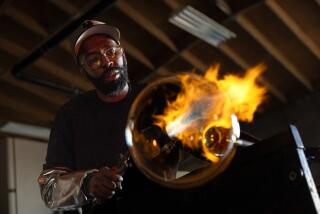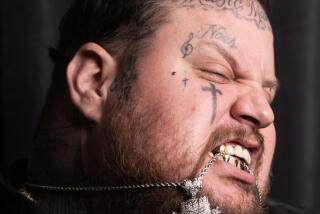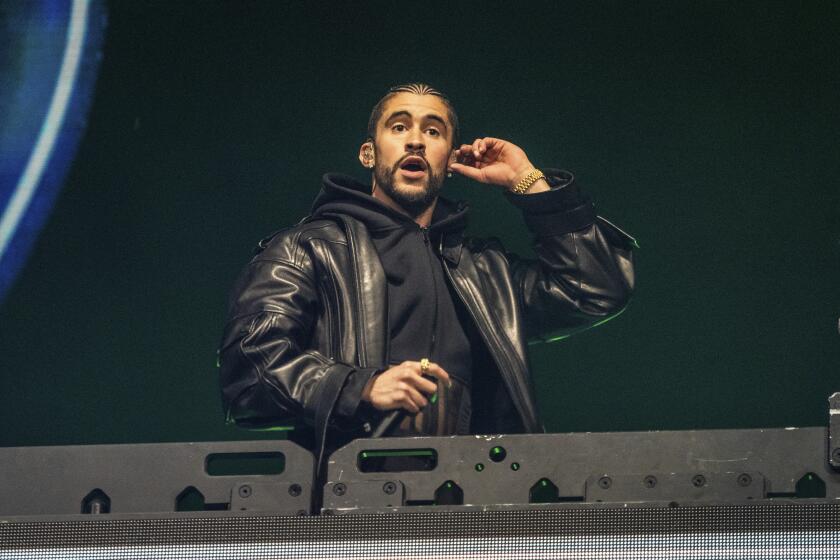A Rap Professor Returns to ‘Old School’ : Pioneer rapper Kurtis Blow has a knack for mischief on his KPWR show, which pays homage to early hits and the styles that inspired them.
- Share via
Whenever Kurtis Blow says that he was an important figure in the development of rap music, somebody flinches.
“They look at you like you’re a criminal,” says Blow, sitting for an interview in a Burbank deli. “Everyone swears we’re gangsters or we have guns.”
As he speaks, the engaging Blow, 36, is brandishing nothing more lethal than a turkey sandwich loaded with extra mayonnaise. Dressed in jeans, denim shirt, basketball shoes and cap, he dips his sandwich into a cup of mayo before each bite.
“I’m a mayonnaise freak,” he says.
Across the street and eight floors up sit the studios of KPWR-FM (105.9), where Blow works as a weekend deejay and host of “The Old School Show,” a Sunday night mix of music and mischief that pays homage to early rap hits and the soul, funk and R&B; standards that inspired them.
The show--and a renewed interest in “old school” music in general--has helped revive Blow’s career, which had been on the wane for almost a decade.
Blow, who once toured with the Clash and the Commodores and opened shows for the Rolling Stones and Bob Marley, is in demand again. He will embark this month on a two-week tour of Europe that will take him to Italy, France and Germany.
He probably could have stayed out longer, but his priority these days is “The Old School Show,” which gives him a chance to educate listeners about the less incendiary roots of rap.
“I love that show,” says Blow, who was a broadcasting major at City College of New York before his career took off in 1980 with the release of his most familiar song, “The Breaks,” a catchy, philosophical rap that sold 600,000 copies and ensured his place in history as one of the first commercially successful rap artists.
Blow, partial to the records that shape his show, is not sure what to think about the controversy now surrounding the musical genre he helped to develop into a mainstream pop force.
“I have mixed feelings,” he says. “It’s like a love-hate relationship. I hate it because you work so hard all your life to do something positive, to build something, and it turns out to be negative. And that’s not cool. . . .
“But I have to support [today’s more hard-core rappers] because . . . they remind me of myself when we first started. We were rebels; the music industry didn’t like us. I had to crawl and fight and sell this new idea to the rest of the world. I was a pioneer.”
When Blow released his first single, “Christmas Rappin’,” in 1979, he hoped to make enough money to cover his tuition.
Inspired by Cool DJ Herc, a Jamaican who has been described as “the Godfather of Hip-Hop,” Blow had been performing in his native Harlem for several years by the time he enrolled at CCNY.
“When I was in college, I knew that rap was so malleable as an art form that, sooner or later, I would be able to do something with it,” he says. “I knew it was something special and something that I really loved, but I didn’t think I could base a career around it or make a whole lot of money.”
The success of “Christmas Rappin’ ” and “The Breaks,” which between them sold about 1 million copies, made Blow and hundreds of other would-be rappers fully aware of the music’s widespread appeal. And it made Blow an icon.
“Whenever you see someone that comes from your background make it, it’s inspirational,” says rapper-actor Ice-T, a recent guest on “The Old School Show.” “It goes far beyond what they say on the records--it’s just the fact that they made it.”
Blow, positioning himself as a vanguard, steered clear of the hard-core rap that followed, never even cursing in his songs.
“It was an image thing for me,” says Blow, who was born Kurt Walker. “We were fighting the masses, trying to infiltrate the mainstream, and I knew that if we came out like gangbusters--boom, boom, [expletive], [expletive]--that it wouldn’t get us anywhere. The people in control would say, ‘No, no.’ And at that time, they could have [squashed rap].
“I knew we were on the chopping block, and somebody had to do it this way and sacrifice. The sacrifice was I didn’t sell a lot of records [after his initial success], because a lot of people thought my stuff was corny.
“And then Run-DMC came along [several years later] and was [more] hard-core. . . . By then, it was cool because I had opened the door and people were ready for the next level.”
By the mid-’80s, however, Blow’s priorities had changed. Newly married and ready to start a family, he moved from New York to Baldwin Hills. He continued to release albums, but his sights had shifted: He hoped to break into Hollywood as an actor after earning good notices for his work in “Krush Groove,” a rap-themed 1985 movie, and starring in a soft-drink commercial.
His acting career never took off, “but I’ve gotten close several times,” says Blow, who has since moved with his wife and three sons to Woodland Hills and is currently peddling a screenplay he co-wrote with a friend.
Blow released his last album in 1990 and had all but dropped out of the music business before KPWR started playing some of his old songs about three years ago.
“I got wind of this and started hearing all this ‘old school’ stuff on the radio,” he says. “They started playing ‘The Breaks,’ and I’m like ‘Oh, my God, I’m on rotation two or three times a day.’ So I said to myself, ‘I’ve got to capitalize on this. Maybe I can get my career going again.’ Dollar signs started lighting up in my head.”
KPWR backed Blow in a series of shows, spawning a relationship that led to the station offering him a chance to try out as a deejay.
A handful of guest spots led to his hiring in April as host of “The Old School Show.” He has brought a party feel to the four-hour program, attracting a variety of guests, including Run-DMC, Jody Watley, Tone-Loc and Ice-T.
“It’s really fun,” he says. “It’s not like I just play records and say, ‘Contest time.’ We like to give them a little show, a little variety.”
Michelle Mercer, the station’s general manager, calls Blow a natural as a broadcaster.
“He just has a knack for it,” says Mercer, who described the rapper as “inherently entertaining.”
At this point, Blow says, he could probably make more money by taking his show on the road for an extended tour.
“But I’ve been there, done that,” he says, “and this show is so much fun. It’s really important to me.”
More to Read
The biggest entertainment stories
Get our big stories about Hollywood, film, television, music, arts, culture and more right in your inbox as soon as they publish.
You may occasionally receive promotional content from the Los Angeles Times.










